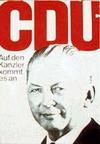After the disappointing results in the election last September, the CDU is doing some soul-searching. Angela Merkel is leading a "Values Discussion" in Berlin with a group of party members. The results so far would seem to indicate that CDU wants to take the "C" in its name seriously, and is returning to its Christian roots:
"Some 800 participants attended a small party conference in Berlin Monday, where the topic on hand was a reassessment of the ruling Christian Democratic Union’s values. CDU leader Angela Merkel took the opportunity to call for fundamental change, but stressed the need to keep Christian values at the core of the party’s ideology."
"Merkel said the basis of the CDU manifesto needs to be Christian values, and warned that the party has to "figure out what it can absolutely not afford to lose." She urged the CDU to discuss basic values with people from other countries."
Still, the new party slogan she proposes – Neue Gerechtigkeit durch mehr Freiheit (New Justice through More Freedom) – has been rejected by Karl-Josef Laumann, head of the CDU’s workers’ organization CDA (Christlich-Demokratische Arbeitsnehmerschaft) as still too neo-liberal -that is insufficiently Christian:
"Neue Gerechtigkeit durch mehr Freiheit." Dieser Leitspruch ist geeignet, unsere Partei auf einen Irrweg zu führen. Wie das Düngen des Apfelbaums nicht zu neuem Wachstum eines Birnbaums führt, gibt es auch keine Gerechtigkeit durch mehr Freiheit. Es stimmt, wir müssen künftig mehr Lasten tragen. Doch wenn Arbeitnehmer bis zum 67. Lebensjahr arbeiten sollen, müssen Unternehmer50jährige einstellen. Wenn wir mehr Kinder in Deutschland wollen, dann müssen wir die 1,7 Millionen Kinder, die unter der Armutsgrenze leben, aus der Armut herausholen. Wenn Arbeitnehmer auf Lohn verzichten, um dem Unternehmen in schwieriger Lage zu helfen, dann müssen sie auch an Kapital und Gewinn beteiligt werden. Hier ist die CDU gefordert. Nur Solidarität macht Schweres leichter. Nur wenn alle an einem Strang ziehen, können wir in Deutschland etwas bewegen.
Solidarity, equitable distribution of wealth: these are concepts that sound very Social Democratic. But what Laumann is proposing (and Merkel as well, albeit rather reluctantly) is that the CDU return to its historical roots, which made it a political powerhouse in Germany for decades.
I have been working my way through Tony Judt’s marvelous book: Postwar: A History of Europe Since 1945 Judt analyzes the rise of the Christian Democratic parties in Germany, Italy and France and notes:
"If anything, Christian Democrats in the first post-war years saw free-market liberals rather than the collectivist Left as their main opponents and were keen to demonstrate that the modern state could be adapted to non-socialist forms of benevolent intervention"
Here is Judt on the phenomenal success of the CDU during the post-war era in Germany:
"The Christian Democrat Union ruled without interruption from the first FRG elections in 1949 until 1966; until Konrad Adenauer resigned in 1963 at the age of 87, he had unbroken charge of the affairs of the Bonn Republic. There were various reasons why the CDU , with Adenauer as Chancellor, enjoyed such a long period of continuous power. One was the strong position of the Catholic Church in post-war West Germany, with the predominantly Protestant regions of Brandenburg, Prussia and Saxony now in Communist hands, Catholics represented just over half the West German population. In Bavaria, where conservative Catholics constituted the overwhelming majority of the voters, the local Christian Social Union had an impregnable power base and used it to secure for itself a permanent place as junior coalition partner in the Adenauer governments.
Adenauer himself was old enough to remember the early years of the Wilhelminian Empire when the Catholic Church had been the target of Bismarck’s Kulturkampf , he was wary of profiting excessively from the new balance of forces and thereby risking renewed conflict around the relations of church and state, especially in the aftermath of the German churches’ distinctly un-heroic record under the Nazis. From the outset, therefore, he sought to make of his party a nationwide Christian electoral vehicle rather than an exclusively Catholic one, emphasizing the socially ecumenical appeal of Christian Democracy. In this he was distinctly successful: the CDU/CSU only narrowly beat the Social Democrats in the first elections of 1949, but by 1957 their vote had almost doubled and the winners’ share of the turnout topped 50 percent.
A related reason for the success of the CDU/CSU alliance (between them the two parties would always henceforth secure 44 percent or more of the national vote) was that, like the Christian Democrats in Italy, it appealed to a broad electorate. The Bavarian Christian Socials … had a restricted appeal, attracting votes from a conservative, church-going community in a single region. But Adenauer’s CDU, though traditionally conservative in cultural matters … was otherwise quite ecumenical: particularly in social policy.
In this way, Germany’s Christian Democrats established a trans-regional, cross-denominational base in German politics. They could count on votes from the countryside and the towns, from employers and from workers. Whereas the Italian Christian Democrats colonized the state, in Germanythe CDU colonized the issues. On economic policy, on social services and welfare, and especially on the still sensitive topics of the East-West divide and the fate of Germany’s many expellees, the CDU under Adenauer was firmly entrenched as an umbrella party of the majority center – a new new departure in German political culture."
Can Angela Merkel & Co. again make the the CDU the party of the majority center while continuing to push for reforms? For now, returning to the historical roots appears to be a shrewd strategy.


